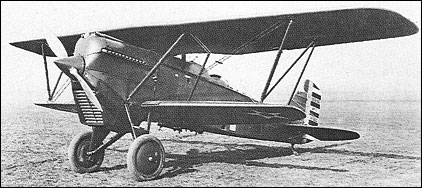|
| The final production PW-9D (the 16th) was retained by
Boeing for the experimental installation of a 600hp
water-cooled Curtiss Conqueror V-1570 engine and, as
the XP-7 (Model 93), was eventually delivered to the
USAAC on 4 September 1928. Distinguished from the
PW-9D by a shorter, deeper nose with a larger radiator,
the XP-7 enjoyed some success during trials, proving
the suitability of the Conqueror for fighter installation,
but proposals to build four service evaluation P-7s were
As the XP-7, the last production PW-9 was used
to test the Conqueror engine for fighter use.
abandoned when it was concluded that the basic PW-9
airframe had reached the limit of its development. The
XP-7, the last Boeing fighter biplane to employ a liquid-cooled
engine, was reconverted to PW-9D standards.
| WEIGHTS |
| Take-off weight | 1479 kg | 3261 lb |
| Empty weight | 1053 kg | 2321 lb |
| DIMENSIONS |
| Wingspan | 9.75 m | 32 ft 0 in |
| Length | 7.31 m | 24 ft 0 in |
| Height | 2.74 m | 9 ft 0 in |
| Wing area | 22.39 m2 | 241.00 sq ft |
| PERFORMANCE |
| Max. speed | 269 km/h | 167 mph |
| Pamela Jane Matheny, e-mail, 23.07.2025 19:36 I lost $567,860 in a major financial scam and spent three years trying to get it back without success. Then I was introduced to Brunoe Quick Hack. Thanks to their skills and persistence, I finally recovered my stolen funds. I strongly recommend their services to anyone facing a similar situation. I highly recommend their services to anyone who has fallen victim to similar scams." Brunoe Quick Hack>> >>Email: Brunoequickhack@gmail.com
WhastAPP +(1) 70578-42635
â€" Pamela Jane Matheny, San Francisco reply | | Jean Douglas, e-mail, 23.07.2024 01:55 I contacted H A C K M A V E N S C R E D I T S P E C I A L I S T a few days ago through text and surprisingly they are carrying out an actual credit fix, my score was raised from 514 to 765 excellent score within 5days and all repossession, derogatory, and inquiries were deleted from my report! I took advantage of this and you too can by reaching out to them via EMAIL: H A C K M A V E N S 5 @ G M A I L (DOT) C O M or Call /Text /Whats-App: [+ 1 (2 0 9) 4 1 7 â€" 1 9 5 7] and I’m sure you will be happy you did. reply | | Frank Donovan, e-mail, 24.01.2024 06:22 I am so happy to have consulted RAPID RESCORE CREDIT for my credit repairs. I discovered that I had 5 negative items on my credit most especially IRS, delayed payments and loans and over 7 hard inquiries from every bureaus and it hindered me from moving forward in my business. I could not access any loan so I started looking for ways to salvage my condition, I then discovered this specialist (RAPID RESCORE CREDIT) on reddit though there were other ones there but my instinct directed me towards Mr Jackson. I was asked for funds to get started with the job and I gave them the benefit of doubt and made some commitments. My fico score was moved from 609 to an excellent score (799) and all the negatives were deleted from my report. Right now I have a clean profile with wonderful trade lines. I’m recommending their services to anyone in dire need of credit fix, you can reach them via JACKSONRAPIDCREDITSCORE@GMAIL.COM reply | | Emmanuel Boatright, e-mail, 17.01.2024 15:44 'There's got to be a great line drawn between these crypto scammers and the havoc they are wrecking on their victims. How would have I survived this tragedy of losing almost Six hundred and fifty-eight thousand Pounds to an impostor posing as a Blockchain trade agent? I just can't stop emphasizing the good deeds of CY-BER GENIE HACK PRO. I don't want to be like the 10 blind men from the bible who Jesus delivered them but only one came to appreciate his gestures to them. I am posting this review for myself, I am contributing my quota of making the internet the safe place it used to be by referring scammed victims to (CY BERGENIEHACKPRO) on Telegram for assistance in tracing, and high chances of recovering their stolen money. I wish those who had been rescued from fraudsters by Cyber Genie Hack Pro's team could post their success stories like mine, doing so, they will reach a larger audience thereby creating more awareness that you can recover your stolen money from scammers. My dealings with Cyber Genie were great, I first had my reservations because I had already lost hundreds of thousands worth of crypto coins, but I was thrilled by their engagement to my task of recovering my stolen money. Never give up if you have been scammed, CYB-ER-GE-NIEH-ACK PRO is all you need. You can find them on their WhatsApp also: (+)(1252-512-0391) Mail them on; (cybergenie(@)cyberservices(.)com)' reply | |
| | Morgan Kennedy, e-mail, 10.12.2023 08:27 Mr. Jerry and I have worked together for many years now in a professional setting. I am a realtor and have clients in various stages of credit repair. Mr. Jerry is ALWAYS the person I recommend to my clients. His services are second to none & he has always done the best job in order to get my clients in a home as quick as possible when credit is holding them back. He has helped my family members, friends, & strangers I have met through my services. Thank you Mr. Jerry for caring about people like you do! You are making a difference!!! Reach out to Jerrylink Credit Group via: jerrylinkgroup@gmail.com or text 6265140620. Thank me later. reply | | Grace Peterson, e-mail, 02.12.2023 03:50 I strongly JERRYLINK CREDIT GROUP: I think they are the best in terms of credit repair. I had worked with different credit companies in the past, but there was no significant change on my credit report. So many credit forums recommended DYI, I tried every credit hack in the book all o no avail. A real estate agent introduced me to Mr. Jerry, who has been helping his clients. Mr. Jerry and his team helped me erase all the negative things on my report, and raised my score to excellent score across all three bureaus. I’m recommending as promised. They are available on gmail: JERRYLINKGROUP AT GMAIL DOT COM or +16265140620 reply | | Animalia, 20.06.2011 14:07 biplane to employ a liquid-cooled engine, was reconverted to PW-9D standards. reply |
|
Do you have any comments?
|
| 
COMPANY
PROFILE
All the World's Rotorcraft
|






